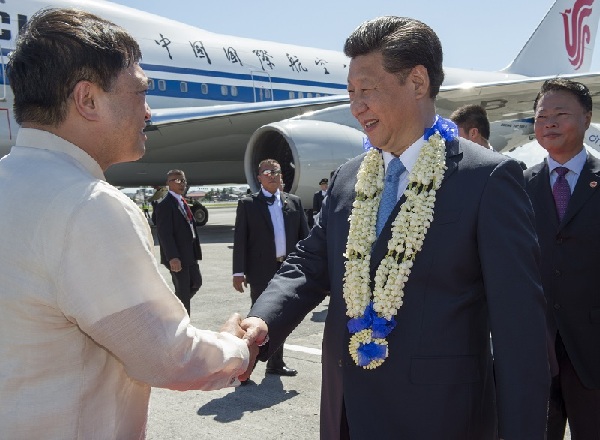Chinese expert: why will president Xi attend the Manila APEC meeting?
Updated: 2015-11-18 13:26
(People's Daily)
|
|||||||||||
 |
|
Chinese President Xi Jinping arrives in Manila, the Philippines, on November 17, 2015, for the 33rd Asia-Pacific Economic Cooperation (APEC) Economic Leaders' Meeting. [Photo/people.cn] |
The 33rd Asia-Pacific Economic Cooperation (APEC) Economic Leaders' Meeting is to be held form November 18 to 19 in Manila, the Philippines. Despite strained Sino-Philippine relations in terms of the South China Sea dispute, Chinese President Xi Jinping decided to attend the meeting.
"It shows that APEC plays an important role for China to participate in global governance. Meanwhile, the participation of China will also be beneficial for APEC to find a new role definition, through which its function can be fully realized," said Liu Chenyang, director of the APEC Study Center at Nankai University in Tianjin, in an article published on People's Daily.
The Fifth Plenary Session of the 18th Communist Party of China (CPC) Central Committee set out to improve China's institutional discourse power in global economic governance. Regional economic cooperation is an effective channel for China to participate in global governance. As the most influential regional economic cooperation mechanism with the highest level and broadest scope in the Asia-Pacific region, APEC is the first regional economic cooperation organization China joined. By participating in APEC cooperation, China established close economic and trade relations with many economies in the Asia-Pacific region and opened its own market, which laid a solid foundation for China to join the World Trade Organization (WTO) and build a diversified international economic cooperation system. Meanwhile, APEC also provides an effective channel for China to promote the establishment of the new international and regional political and economic order, and push forward bilateral and multilateral diplomacy.
At present, the APEC members account for about one third of the world's population, more than 50 percent of the world's GDP and total trade volume. In recent years, the Asia-Pacific regional economic integration is accelerating; At the same time, the battle over who gets to make economic and trade rules has become the focus of each member. Therefore, under the framework of APEC, the Asia-Pacific regional economic integration will not only affect economic growth and prosperity of the region, but also have an important influence on the future of the world's economic development trend and pattern. In this sense, APEC cooperation provides a good opportunity and platform for China to be deeply involved in global governance and to strengthen economic institutional discourse.
In recent years, China's willingness and ability to actively play a leading role in APEC cooperation has significantly improved, which was demonstrated at the 22nd APEC Economic Leaders' Meeting in Beijing last November. The meeting reached an agreement on the roadmap for promoting the process of the Free Trade Area of the Asia-Pacific (FTAAP), which planed a new goal and path for APEC cooperation and is highly appreciated by the international community.
Another thing needs to be emphasized is that the key fields of cooperation APEC is advancing, like trade and investment liberalization and facilitation and all-dimensional connectivity, overlap and accord with the cooperation under the frame of the Belt and Road Initiative and Asian Infrastructure Investment Bank. They can supplement and promote each other. Therefore, by providing a platform for China to participate in global economic governance, the function of the APEC will also be fully tapped and play.
Related Stories
APEC Ministerial Meeting eyes new measures to boost regional economy 2015-11-17 18:35
President Xi arrives in Philippines for APEC meeting 2015-11-17 18:13
China's interaction with APEC members shows Xi's diplomatic charisma 2015-11-17 14:43
Today's Top News
France, Russia launch more strikes against IS
England fans sing French national anthem
France requests European support in Mid East
Hollande pressed to amend foreign policy
Editorial: No double standard on terror
UK press united in condemning Paris attacks
Xi calls for global unity to combat terrorism
Attacks in Paris prompt China to boost security
Hot Topics
Lunar probe , China growth forecasts, Emission rules get tougher, China seen through 'colored lens', International board,
Editor's Picks

|

|

|

|

|

|






